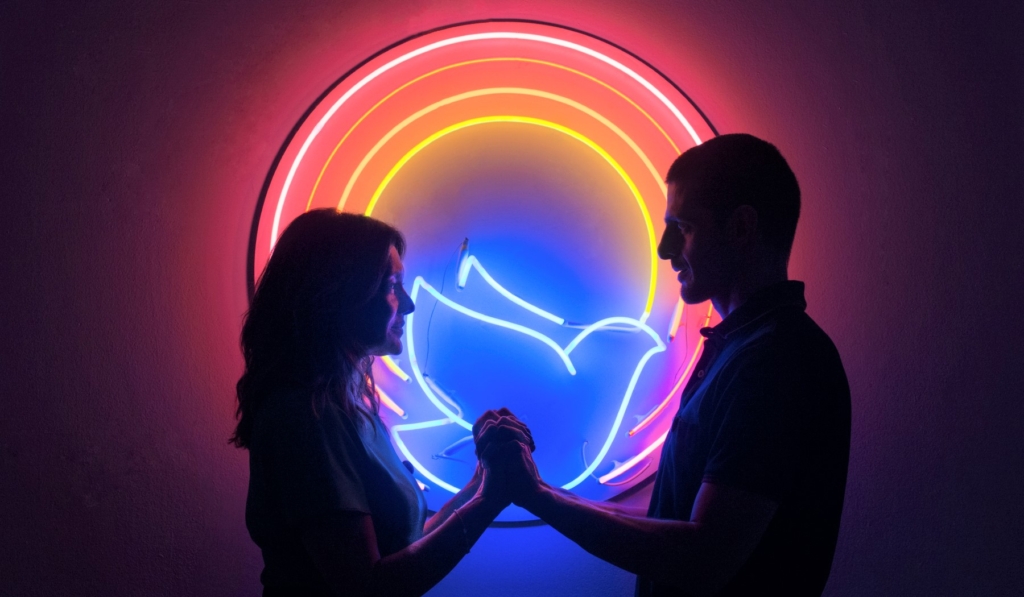

Dystopias, inspired by our worst nightmares, allows artists to interrogate the collective conscience and image what might happen as the result of disastrous choices. This approach never gets old. Take The Handmaid’s Tale, for example, the 1985 novel by Margaret Atwood about a totalitarian regime of religious conservatism that still feels timely. A good dystopia has a terrifying immediacy that never loses its power as a prophecy or premonition. We may say this about Divine Love today or in a couple of years.
This Brazilian movie also shares a similar idea as Atwood’s novel. It takes place in a country governed by conservative values rooted in Christian extremism (evangelical, in this case) in which the heteronormative family is the most sacred institution. There are specific concerns in Brazil right now that makes this material relevant since the election of President Jair Bolsonaro, a conservative leader with strong stances about religion and reproductive issues and opposition to LGBTQ rights. Fortunately, this vision, set in the not so distant future of 2027, is subtle about its connection with the present.
Narrated by the mysterious—almost spectral—voice-over of a child, we learn that the country remains officially secular, albeit much has been adapted to the rigid morality of an evangelical society that interferes directly in the everyday lives of its citizens. Women can work, but they are measured by their marital status and if they are pregnant. Also, Carnival is no longer the most important celebration in the country. It’s been supplanted by an outdoor rave punctuated by Christian electronic music where everyone purifies their souls while fervently dancing: the Party of Divine Love.
In this disturbing time and place lives Joana (Dira Paes), a bureaucrat assigned to a department focusing on divorce cases. She uses her privileged position to prevent as many divorces as possible. Her persuasive manner has contributed to couples reconciling before they file for separation. In recognition of her efforts, many of these happy couples send portraits of themselves as an act of gratitude. In her apartment, Joana has a private altar for them, which reveals a vanity disguised as a commitment to her faith.
Her husband, Danilo (Julio Machado), makes floral arrangements for funerals. Both pose as a perfect couple devoted to God and never miss attending church (also called Divine Love). They have tried to fulfill their marital duties, hoping to bring a new life to the world, but they have failed so far. As a result, Joana seeks spiritual guidance from her pastor (Emilio de Melo) in a drive-thru in which every car has to wait its turn (like ordering a Big Mac); she believes she deserves having a child after saving so many marriages in the name of God.
Director Gabriel Mascaro tells the story from the perspective of Joana, who enables and defends the social norms. It’s left to the imagination what could have happened to those who oppose the regime, if they exist at all. In doing so, Divine Love works as a complex political parable that, ironically, empathizes with the “wrong side of history” to undermine it from within (a growing trend in recent politically minded cinema like Vice and Bombshell or TV shows like Mrs. America). The filmmaker and screenwriters trust that the moral compass of the audience will be enough to understand that this is a nightmare instead of a fantasy.
In proper time, the film reveals the most unsettling rituals behind this alternate future of blinded convictions. Some practices in the Church of Divine Love may at first seem picturesque, until the introduction of its sex rituals in which Joana and Danilo participate in partner-swapping that involves having unprotected sex inside the church. Joana will learn that some blessings can appear as a chastisement and blasphemous.
Mascaro seems more interested in following the characters than in exploring the intriguing world where they live. At 100 minutes, viewers may feel the film is too short with a lot of ground left disappointingly not explored. Divine Love leaves you wanting more, which is a minor flaw for a movie supported by smart ideas and ambitious execution. It’s one of the best South American films of the year and a perfect companion piece to Bacurau, another futurist Brazilian movie that was released this year. It carries a necessary warning that not only seems relevant to Brazil but also for the rest of the world.
















Leave A Comment